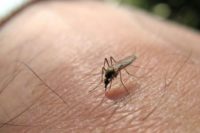Take West Nile Virus precautions during Labor Day weekend

 During the long Labor Day weekend, Americans will spend lots of time outdoors. Along with sunburns and poison ivy, people need to protect themselves from mosquitos that carry the West Nile Virus, which is being felt – sometimes with deadly results – in 47 states.
During the long Labor Day weekend, Americans will spend lots of time outdoors. Along with sunburns and poison ivy, people need to protect themselves from mosquitos that carry the West Nile Virus, which is being felt – sometimes with deadly results – in 47 states.
The Centers for Disease Control and Prevention (CDC) says West Nile is being reported this season at numbers that outpace previous years, dating back to when the virus first was identified in 1999.
The CDC offers the following recommendations for protecting yourself against West Nile:
- Wear insect repellent. Remember: even a short time being outdoors can be long enough to get a mosquito bite. Use an EPA-registered insect repellent such as those with DEET, picaridin or oil of lemon eucalyptus. Don't apply repellents containing permethrin directly to skin. Do not spray repellent on the skin under your clothing.
- When weather permits, wear long-sleeves, long pants and socks when outdoors. Mosquitoes may bite through thin clothing, so spraying clothes with repellent will give extra protection.
- Be aware of peak mosquito hours. The hours from dusk to dawn are peak biting times for many species of mosquitoes. Take extra care to use repellent and protective clothing during evening and early morning -- or consider avoiding outdoor activities during these times.
- Drain standing water; mosquitoes lay their eggs in it. Limit the number of places around your home for mosquitoes to breed by getting rid of items that hold water. Need examples? Learn more on the CDC’s Prevention of West Nile Virus Question and Answer page.
- Install or repair screens. Some mosquitoes like to come indoors. Keep them outside by having well-fitting screens on both windows and doors. Offer to help neighbors whose screens might be in bad shape.
- Report dead birds to local authorities. Dead birds may be a sign that West Nile virus is circulating between birds and the mosquitoes in an area. Over 130 species of birds are known to have been infected with West Nile virus, though not all infected birds will die. It's important to remember that birds die from many other causes besides West Nile virus.
Looking for a reprint of this article?
From high-res PDFs to custom plaques, order your copy today!





